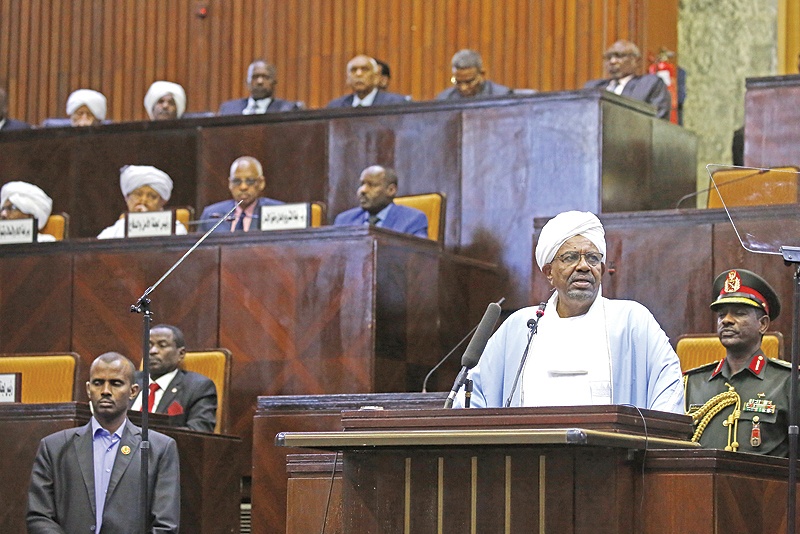KHARTOUM: A verdict in the corruption trial of Sudan's deposed president Omar al-Bashir is expected to be delivered tomorrow, months after his ouster in April in the face of unprecedented mass protests.
Bashir has been on trial in a Khartoum court since August on charges of illegally acquiring and using foreign funds. The ex-president, who ruled Sudan with an iron fist for 30 years, was toppled by the army on April 11 after months of demonstrations triggered by an acute economic crisis.
The verdict is the first faced by the veteran leader, and if found guilty, the offences could land him behind bars for more than a decade.
Bashir has appeared at several hearings in the trial, following the proceedings from inside a metal cage wearing the traditional Sudanese white jalabiya and turban.
At the start of the trial, judge Sadeq Abdelrahman said authorities had seized 6.9 million euros as well as $351,770 and 5.7 million Sudanese pounds ($128,000) from Bashir's home.
While the former president admitted to having received $90 million from Saudi leaders, the trial concerns only $25 million of these funds received shortly before his ouster from Saudi Arabia's de facto ruler Crown Prince Mohammed bin Salman.
Bashir said the money seized from his home was the remainder of $25 million.
The funds, he said, formed part of Sudan's strategic relations with Saudi Arabia and were "not used for private interests but as donations".
Bashir's lawyer Mohamed al-Hassan told reporters the ex-president's defence does not see the trial as a legal case, but as "a political case".
Sudan is one of the countries worst affected by corruption in the world, coming in at 172 out of 180 in watchdog group Transparency International's global ranking.
According to Adam Rashid, deputy secretary-general of the Darfur Bar Association, a group of Sudanese lawyers, the ex-president should be tried for his crimes, "small or large".
For him, this trial for corruption is "a very small case compared with the crimes committed by Bashir", he said, adding, "the victims of his crimes in Darfur, they don't care about this case".
The trial does not concern the weighty charges against Bashir levied by The Hague-based International Criminal Court (ICC) over the past decade.
Bashir is wanted by the ICC for his alleged role in the Darfur war that broke out in 2003 as ethnic minority rebels took up arms against Bashir's then Arab-dominated government, accusing it of marginalising the region economically and politically.
Khartoum applied what rights groups say was a scorched earth policy against ethnic groups suspected of supporting the rebels -- raping, killing, looting and burning villages.
The ICC has accused Bashir of genocide, war crimes and crimes against humanity for his role in the conflict that left around 300,000 people dead and 2.5 million displaced, according to the United Nations.
After Bashir was toppled, ICC prosecutors asked that he stand trial for the killings in Darfur. But Khartoum has not yet authorised his extradition.
The army generals who initially seized power after the president's fall refused to hand 75-year-old Bashir over to the ICC, based in The Hague.
Although Sudan has not ratified the Rome Statute, the founding document of the ICC, it has a legal obligation to arrest heads of state whose alleged crimes fall under the court's mandate.
The umbrella protest movement Forces of Freedom and Change, have already indicated they have no objection to extradition.
Meanwhile, on November 12, Sudanese authorities filed charges against Bashir and some of his aides for "plotting" the 1989 coup that brought him to power. In May, the attorney general said Bashir had been charged with the deaths of those killed during the anti-regime demonstrations that led to his ouster, without specifying when he would face trial. - AFP


